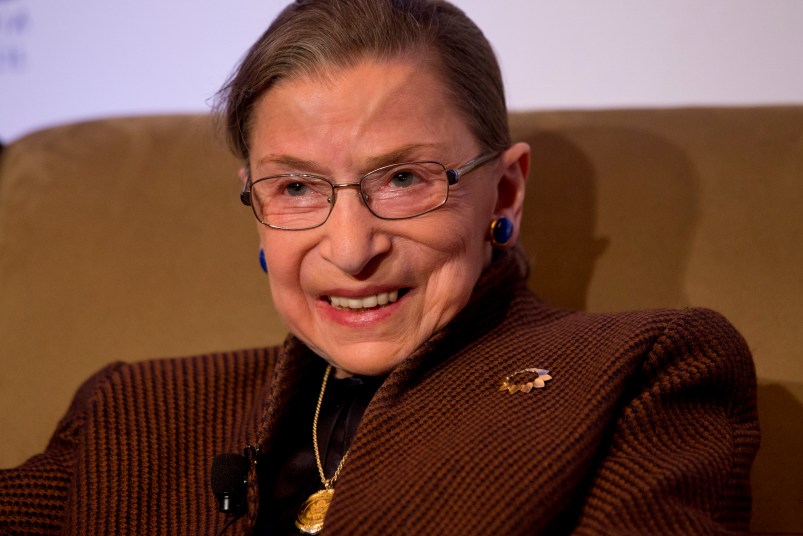Justice Ruth Bader Ginsburg tore into the Supreme Court’s ruling on Monday against Obamacare’s contraception mandate, saying the court has “ventured into a minefield” with an unprecedented decision that invites owners of many kinds of commercial enterprises to seek exceptions from laws they object to on religious grounds.
By a 5 to 4 vote, the Court held that the mandate violates the 1993 Religious Freedom Restoration Act, which says laws that burden a person’s exercise of religion be narrowly tailored to meet a compelling governmental interest. Justice Samuel Alito, writing for the five Republican-appointed justices, said the birth control requirement cannot be imposed on “closely held” for-profit corporations.
“In a decision of startling breadth, the Court holds that commercial enterprises, including corporations, along with partnerships and sole proprietorships, can opt out of any law (saving only tax laws) they judge incompatible with their sincerely held religious beliefs,” she wrote. “The Court’s determination that RFRA extends to for-profit corporations is bound to have untoward effects. Although the Court attempts to cabin its language to closely held corporations, its logic extends to corporations of any size, public or private.”
Ginsburg, a Bill Clinton-appointed justice, linked to a list of large private companies — which includes Cargill, Koch Industries and Dell — which may also be eligible to opt out of the mandate under the Supreme Court’s ruling.
She argued that the mandate is backed by a compelling governmental
interest and is backed by a “wealth of empirical evidence,” writing that “the mandated contraception coverage enables women to avoid the health problems unintended pregnancies may visit on them and their children.”
Ginsburg noted that the case, brought by the Christian owners of the retail chain Hobby Lobby, marks the first time the U.S. Supreme Court has exempted a for-profit corporation from a generally applicable law on religious grounds.
“The absence of such precedent is just what one would expect, for the exercise of religion is characteristic of natural persons, not artificial legal entities,” she wrote. She concluded: “Indeed, approving some religious claims while deeming others unworthy of accommodation could be ‘perceived as favoring one religion over another,’ the very ‘risk the Establishment Clause was designed to preclude.’ The Court, I fear has ventured into a minefield.”
Ginsburg’s dissent was joined in full by Justice Sonia Sotomayor and for the most part by Justices Stephen Breyer and Elena Kagan.







Gee, all 3 women voted against it - all 5 Catholic males voted for it. Moving the US one step more backward to the fantasy of what 'Murica used to be (white, male, racist, perfect.)
Talk about a slippery slope.
The “conservative” wing of the S.Ct. is so activist in its rulings that they are really seeking to reshape the US into a place that is unrecognizable. Pvt corporations now have it better than churches. They can impose their religious beliefs on employees and they can make unlimited donations to the political causes and politicians of their choice. And they get to make lots of money that they can hide overseas so they don’t have to pay those burdensome taxes.
The good life.
Next up:
God says I don’t have to pay taxes!
God says it’s OK that I shot my neighbor dead!
God told us to dump that toxic waste there!
The SCOTUS has possibly just rendered all of our laws invalid.
And after that…
My God says I don’t have to hire/serve niggers because they’re beneath the White man.
My God also says that I don’t have to promote women to higher positions in my company because they’re beneath the White man.
Well, I know one thing.
The motive to vote just became supercharged.
Not so much a reaction here, but at least the union busting decision is covered.
Salon people are energized, very, very energized.